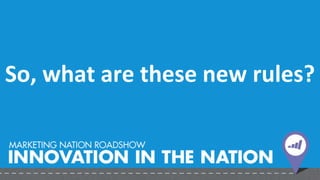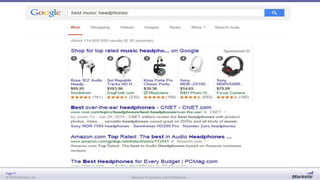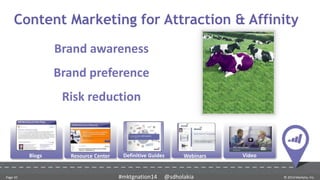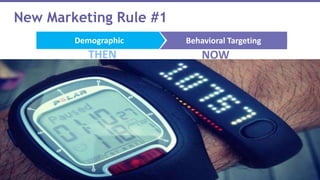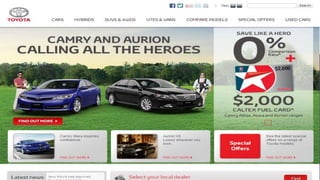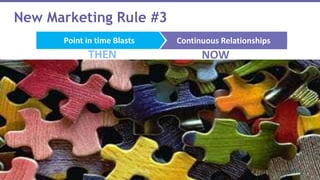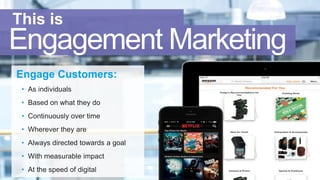The New Rules of Marketing - Sanjay Dholakia
- 1. The New Rules of Marketing Sanjay Dholakia Chief Marketing Officer Marketo @sdholakia #mktgnation14
- 2. Marketo Company Overview 3,500 customers across 20+ industries in 36 countries Marketing First • Helping marketers master the art and science of digital marketing • Unparalleled expertise #1 independent marketing platform: • Marketing software - built for marketers, by marketers • Fastest growing marketing technology company • Largest partner solution ecosystem Top rated by Analysts including Sirius Decisions, Gartner, and Forrester Page 2 © 2014 Marketo, Inc. Marketo Proprietary and Confidential
- 4. Today’s Digital World has Made it Hard for Marketers 70% Of a customer’s journey today is self directed1 Marketo Proprietary and Confidential © 2014 Marketo, Inc. Page 4 2900 Marketing messages per day vying for your customer’s attention2 50% of all purchasing decisions are influenced by third-parties3 1. SuperProfile 2. Forrester 3. McKinsey Quarterly
- 5. The Rules of Marketing are Being Rewritten
- 6. It’s a Marketing First World Page 6 #mktgnation14 @sdholakia © 2014 Marketo, Inc.
- 7. So, what are these new rules?
- 8. New Marketing Rule #0 Find customers Be found THEN NOW Page 8 © 2013 Marketo, Inc. Marketo Proprietary and Confidential
- 9. Page 9 © 2014 Marketo, Inc. Marketo Proprietary and Confidential
- 10. Content Marketing for Attraction & Affinity Brand awareness Brand preference Risk reduction Blogs Resource Center Definitive Guides Webinars Video Page 10 #mktgnation14 @sdholakia © 2014 Marketo, Inc.
- 11. Social Marketing for Amplification & Reach Reach & Engagement Social Lift Social Lift Social Lift Social Lift Social Lift Landing Pages Website Facebook Pages Online Ads Email Social Lift Events
- 12. New Marketing Rule #1 Demographic Behavioral Targeting THEN NOW Page 12 © 2014 Marketo, Inc. Marketo Proprietary and Confidential
- 13. “Who I am is less important than what I do” Page 13 © 2014 Marketo, Inc. Marketo Proprietary and Confidential
- 14. © 2014 Marketo, Inc. Marketo Proprietary and Confidential
- 15. Behavioral Targeting Drives Relevance Top Tactics to Increase Email Engagement Page 15 #mktgnation14 @sdholakia © 2014 Marketo, Inc.
- 16. New Marketing Rule #2 Mass Advertising 1:1 Communication THEN NOW Page 16 © 2014 Marketo, Inc. Marketo Proprietary and Confidential
- 18. Page 18 #mktgnation14 @sdholakia © 2014 Marketo, Inc.
- 19. Page 19 #mktgnation14 © 2014 Marketo, Inc.
- 20. New Marketing Rule #3 Point in time Blasts Continuous Relationships THEN NOW Page 20 © 2014 Marketo, Inc. Marketo Proprietary and Confidential
- 21. When it comes to marketing, nobody wants to get blasted
- 22. © 2014 Marketo, Inc. Marketo Proprietary and Confidential
- 23. 2% Page 23 #mktgnation14 @sdholakia © 2014 Marketo, Inc.
- 24. Nurturing: Building relationships people over time through engaging conversation Page 24 #mktgnation14 @sdholakia © 2014 Marketo, Inc.
- 25. New Marketing Rule #4 Few / isolated channels Exploding / integrated channels THEN NOW Page 25 © 2014 Marketo, Inc. Marketo Proprietary and Confidential
- 26. Page 26 © 2014 Marketo, Inc. Marketo Proprietary and Confidential Source: Pitney Bowes Infographic
- 27. © 2014 Marketo, Inc. Marketo Proprietary and Confidential
- 28. New Marketing Rule #5 Intuitive decision making Data-driven automation THEN NOW Page 28 © 2014 Marketo, Inc. Marketo Proprietary and Confidential
- 29. Page 29 #MKTGNATION14 © 2014 Marketo, Inc.
- 30. Why Measuring Return is Hard • Multiple touches. 7 • Unclear success. Click • Multiple influencers. 5-21 Page 30 #mktgnation14 @sdholakia © 2014 Marketo, Inc.
- 31. Now We Can Track the Journey Screenshot: Marketo Revenue Cycle Analytics Page 31 #mktgnation14 @sdholakia © 2014 Marketo, Inc.
- 32. Page 32 #mktgnation14 © 2014 Marketo, Inc.
- 33. It’s a new world, with new rules #0 Find customers Be found Demographic Behavioral Targeting Mass Advertising 1:1 Communication Point in time Blasts Continuous Relationships Few / isolated channels Exploding / integrated channels Intuitive decision making Data-driven automation THEN NOW #1 #2 #3 #4 #5 Page 33 © 2014 Marketo, Inc. Marketo Proprietary and Confidential
- 34. This is Engagement Marketing Engage Customers: • As individuals • Based on what they do • Continuously over time • Wherever they are • Always directed towards a goal • With measurable impact • At the speed of digital
- 35. Thank You Sanjay Dholakia @sdholakia sanjay@marketo.com #mktgnation14
Editor's Notes
- #2: Case study of how Marketo using Marketo to drive our business. One of the fastest growing software companies of all time. So doing something right. Showing examples of our actual campaigns.
- #3: marketi7 years of 60%+ YoY growth Stand alone, open, every dollar invested in marketing ‘Other guys will be trying to figure out the bag of doorknobs’ Innovating on an integrated platform
- #4: So how are we responding to this? Not good. So between the marketers that are still batching and blasting, or sending personalized messages that aren’t relevant right now, this is kind of what it feels like to be a consumer today. On any given day, the average customer will be exposed to 2,904 media messages, will pay attention to 52 and will positively remember 4 – SuperProfile 2010
- #6: I’ll give you the punch-line first – every marketer in the world, regardless of size or industry – can, and should, market like Amazon.com Raise your hand if you are an Amazon customer…? (we’re proud to call them a Marketo customer by the way) I spend more money with them than I ever intended to…and, I’m usually happy about it. Why? Because they have created a relationship with me, seemingly anticipating my every need – an enduring, personal relationship. They have embodied the new rules of Marketing….<next slide>
- #7: One of the things we hear a lot in talking with CMO’s is that their biggest pain point was not so much measuring engagement for their campaigns, but rather, having the ability to PROVE the impact that marketing was having on revenue. Sales typically does a really good job presenting their forecast, what they expected to bring in in terms of revenue, and the CRM system made it easy for them to convey these meaningful metrics to the exec team. CMO’s that were unable to prove their impact in terms of revenue, often weren’t part of the discussion when talking about revenue numbers. And CMO’s were sick of being second class citizens in this regard. They wanted to earn their seat at the revenue table. And today, where marketing owns 50% to 80% of the revenue cycle, they should have an equal voice in revenue discussions, and Marketo helps provide marketing with the data they need to have this voice. But this is hard to too…because it takes an average of seven touches before somebody converts to an opportuntiy and multiple people are interacting with you during the journey..
- #8: Let’s talk about TOFU. I mentioned that we really focus on content to build awareness for our brand. And the reason why is that we’ve moved from a world of information scarcity to information abundance. In a world of information scarcity, it was easy for people to pay attention to what marketers had to say. But with so much information available, that attention is pretty much gone. People just don’t have the time or capacity to pay attention to every marketing message thrown in front of them today.
- #9: New Rule #1 is that marketers need to make a shift from demographics-driven marketing to behavior-driven marketing I can tell my friends and colleagues anything I want about how much I am working out, but this Nike device on my wrist actually *knows* and can What I *do* tells you a lot about what my interests and intent are – well before I ever express anything explicitly Think about Amazon in this context – they are playing close attention to what I like and don’t like….not making assumptions about me based on who I am, how old I am, or where I live….it’s that behavior that they are using to think about what will be most relevant and useful to me…<Next slide>
- #10: New Rule #1 is that marketers need to make a shift from demographics-driven marketing to behavior-driven marketing I can tell my friends and colleagues anything I want about how much I am working out, but this Nike device on my wrist actually *knows* and can What I *do* tells you a lot about what my interests and intent are – well before I ever express anything explicitly Think about Amazon in this context – they are playing close attention to what I like and don’t like….not making assumptions about me based on who I am, how old I am, or where I live….it’s that behavior that they are using to think about what will be most relevant and useful to me…<Next slide>
- #11: Customer version
- #12: Social plays an increasingly large role in the cross channel experience. We believe social is just a channel. Don’t do social campaigns… make every campaign social.
- #13: New Rule #1 is that marketers need to make a shift from demographics-driven marketing to behavior-driven marketing I can tell my friends and colleagues anything I want about how much I am working out, but this Nike device on my wrist actually *knows* and can What I *do* tells you a lot about what my interests and intent are – well before I ever express anything explicitly Think about Amazon in this context – they are playing close attention to what I like and don’t like….not making assumptions about me based on who I am, how old I am, or where I live….it’s that behavior that they are using to think about what will be most relevant and useful to me…<Next slide>
- #15: Toyota, a Marketo customer, is a shining example of understanding behaviors and using them to optimize their marketing Think about how much you could learn about someone through the car buying process. 15 years ago, if I wanted to buy a car, I started at the dealership, talking to a sales person. Today, it starts with the web. And based on your web behaviors, Toyota knows what type of car you’re interested in. They know what options you care about and what colors you’ve looked at. Can you imagine a sales person calling you and confidently saying “We have your car on the lot. Come on by.” Toyota is using behavior to tailor what they communicate to the prospective buyer – they are even using *non-behavior* -- if someone has configured a car online, but has *not* come back to the website in 5 days, then send them offer A, instead of message B And that means they sell more cars, faster. And, even bring back a few lost ones. …<next slide>
- #16: The key to relevance is behavioral targeting. So you want relevancy and engagement – but this requires sophisticated targeting that combines online body language (web traffic, search behavior, email response) plus transactional data plus with lifestyle and demographic data (personas) When behavioral cues are not used, email can be experienced as a dissonant interruption. What the sender considers a coordinated "drip campaign" may feel more like water torture to the receiver.
- #17: New Rule #2 is that marketers need to use that behavioral data to make a shift from communications that are general in nature to communications that are truly individualized on a 1:1 basis Think about Amazon again in this context – they are noticing that I was exploring fall and winter boots, but didn’t buy anything yet. They sent me a note saying “Hey Sanjay, just wanted to let you know those boots you were looking at 2 weeks ago just went on sale.” It was a message just for me. Not even a general email about “boots” – something specific about me. I love that – that makes me pay attention because it is relevant. …<next slide>
- #18: Because in most cases a “blast” will miss the mark. Hence, 20% open rates.
- #19: The answer: our communications must be more trusted, more relevant, and more strategic. It must be more engaging. Traditional batch and blast feels like shouting, engagement marketing feels more like a natural conversation. Notice how these women are engaged in conversation. There’s talking, but also listening going on. And the conversation, at least by the looks of it, seems to have a flow to it. [Refer back to this throughout the presentation: how important it is to effectively listen to online body language.]
- #20: Again, these New Rules are being applied everywhere now Take the example of another one of customers, Christiana Care Health Systems, which is a hospital network in the US They originally started this behavior driven, 1:1 communication with the intent of having new patients choose their hospital…but, they soon realized that it was a huge benefit for their entire lifecycle of communication. They are able to communicate with customers based on their specific conditions – send communications about Diabetes management to the person who has Diabetes…not information about their many other, albeit valuable, services The business impact? They saw a dramatic decrease in the number of Emergency Room visits, because people paid attention to the 1:1 information that was being sent to them and they learned how to take care of themselves better. …<next slide>
- #21: New Rule #3 is that marketers need to shift from point in time communications that are disconnected from each other like these puzzle pieces – and therefore never form any kind of cohesive thread or picture – to communications that form a continuous relationship that gets deeper and deeper over time This level of personalization means that you no longer have to market AT customers You can build long-term relationships WITH customers. These relationships start the first time a consumer hears about you Grows as they engage with you, purchase from you, and become advocates for you Think about Amazon again in this context – they are not just talking to someone about their point in time needs, but they are continuously learning about me. They are using their accumulated experience with me about what I like and what I don’t like to communicate with me about particular genres of books and authors…and, importantly, not about others. It’s now our responsibility to create these relationships with more people, faster than we ever have before And we can do it…<next slide>
- #22: Don’t blast – that doesn’t “feel good”. It hurts.
- #23: We can do it in the way Harvard Business School and many of the other education clients we have do it Think about it – the ‘sales cycle’ or relationship often begins with someone *years* before they ever think of applying to Harvard…and continues for years afterwards By listening and responding to that person based on topics that they find interesting and engaging, Harvard drives up the interaction and ultimately affinity with that person But, a relationship with that person changes dramatically throughout their lifecycle – after they are an applicant, they are a student, and after that, they are an alumnus As alumni, Harvard wants to make sure that they remain engaged, supporting Harvard with time and money That’s what these continuous relationships result in – more applicants, more students and more funds raised – all because they learn over time what’s important to people. …<next slide>
- #24: So lead nurturing is a really important idea, and is central to everything we do at marketo. And it is a complicated topic. In fact, we’ve written books about it, and you can find them on our website.
- #25: So lead nurturing is a really important idea, and is central to everything we do at marketo. And it is a complicated topic. In fact, we’ve written books about it, and you can find them on our website.
- #26: New Rule #4 is that marketers need to graduate from siloed communications to integrated, multi-channel engagement that actually shows someone that you know who they are and that you are listening to them There’s no longer a separation between television advertising and direct mail There’s not even a separation between offline and online, or traditional and digital Amazon has been integrating engagement across channels for a long time – specific behaviors on a webpage by an individual trigger a unique communication in email that is aware of exactly what I did on that webpage As marketers, we have to coordinate campaigns that make the most out of every channel. …<next slide>
- #27: New Rule #4 is that marketers need to graduate from siloed communications to integrated, multi-channel engagement that actually shows someone that you know who they are and that you are listening to them There’s no longer a separation between television advertising and direct mail There’s not even a separation between offline and online, or traditional and digital Amazon has been integrating engagement across channels for a long time – specific behaviors on a webpage by an individual trigger a unique communication in email that is aware of exactly what I did on that webpage As marketers, we have to coordinate campaigns that make the most out of every channel. …<next slide>
- #28: And that’s what our customer the Economist has been doing Customers interact with them through a multitude of channels The web to social media to webinars to live events They know that @sdholakia is the same person as sanjay@marketo.com and ‘score’ each of those interactions as part of full picture of me And, then they communicate with me based on a full 360 view of what I --- and every individual customer -- has done across all of those channels This makes every communication highly relevant – resulting in deeper insight into customers and higher conversions
- #29: Finally, New Rule #5 is that marketers must finally move beyond subjective, gut level decisions to data-driven ones that allow them to finally put John Wanamaker (or at least his infamous quote) to rest In our new world, marketers no longer have to guess at which campaigns drive results Marketers no longer have to guess which customers are ready to buy And they can prove their value, illustrating how every marketing touch impacts every revenue dollar Amazon uses data to not only know what is working, but also to predict what might work in the future – they are able to detect patterns and correlations that might suggest that if someone has purchased a book about baby names and a baby outfit that maybe they might be in the market for a crib Every marketer can now rely on data to use the right campaigns across the right channels …<next slide>
- #30: Let’s talk about measuring what the CXO cares about.. While you may not be doing all this analysis now, you most likely will in their future. [Be sure to focus on this point a lot so you don’t lose them.] ROI: First investment – then revenue Measure ROI to find not just what works, but what works better Establish goals upfront Make sure programs are measureable Focus on decisions that improve ROI
- #31: But you know, marketing measurement is hard. And it’s hard for a number of reasons. Back in the age of information scarcity, it made sense to tie all the revenue for a win back to the source campaign, but today that doesn’t make any sense at all. Today there are multiple campaigns touches. For Marketo, our buyers engage with an average of 7 marketing campaigns before buying. At some companies, the number is as high as 25 to 30. Campaign success is also hard to measure. Often campaign successes are tied to meaningless criteria such as a click, which doesn’t correlate to the desired business outcome the marketer had in mind for the campaign. Further complicating mattes is that there isn’t often just a single buyer. You may have two buyers, and both come into the process at different times, through different marketing campaigns. With Marketo, we’ve seen as many as 21 people involved in the buying decision. Feel bad for the rep! So how do you measure ROI with that sort of complexity. It starts with actually having the data. I’ve seen situations where sales will close a large deal, and marketers go through a manual effort to figure out, and show the different ways that marketing helped closed the deal, so that they get some credit for it. And that can get crazy pretty quickly.
- #32: We get a complete view of how this deal was won. Marketing was keeping in touch with Sarah before this opportunity was created. And the story behind this deal, which is a real deal we won, is that Sarah had downloaded a DG, gone to an event, and just before the opportunity was created, went to Manny, someone on her team, and asked him to investigate Marketo. Only when you have a marketing system that can show you all of these touches across the buying journey, can you really understand how marketing is driving revenue.
- #33: Marketers like the ones at Slimband. Slimband is the largest surgical weight loss center in Canada. They have many, many people that are interested in their solutions, so they scoring every new visitor and possible consumer They then use a data-driven model to look at past and current customers to *predict* who will purchase from them and target those consumers with specific communication When you know who’s most likely to purchase, you can focus marketing dollars on the most valuable efforts And that results in higher conversions and greater sales.
- #34: It’s a new world…with new marketing rules Everyone in this room can now exploit these rules Whether you market to ten thousand or 10 million…whether you are in ecommerce, consumer packaged goods, education, healthcare, or any other business, you can market to engage consumers just like Amazon.com has for years Everyone in this room can build personal relationships with their customers And drive higher conversions and ever greater revenue.







